- Home
- Chris Ryan
Bad Soldier: Danny Black Thriller 4
Bad Soldier: Danny Black Thriller 4 Read online
Also by Chris Ryan
Non-fiction
The One That Got Away
Chris Ryan’s SAS Fitness Book
Chris Ryan’s Ultimate Survival Guide
Fight to Win
Fiction
Stand By, Stand By
Zero Option
The Kremlin Device
Tenth Man Down
Hit List
The Watchman
Land of Fire
Greed
The Increment
Blackout
Ultimate Weapon
Strike Back
Firefight
Who Dares Wins
The Kill Zone
Killing for the Company
Osama
Masters of War
Hunter Killer
Hellfire
Deathlist
Chris Ryan Extreme
Hard Target
Night Strike
Most Wanted
Silent Kill
In the Alpha Force Series
Survival
Rat-Catcher
Desert Pursuit
Hostage
Red Centre
Hunted
Blood Money
Fault Line
Black Gold
Untouchable
In the Code Red Series
Flash Flood
Wildfire
Outbreak
Vortex
Twister
Battleground
In the Agent 21 Series
Agent 21
Reloaded
Codebreaker
The Wire
Deadfall
Under Cover
Endgame
Bad Soldier
Chris Ryan
www.hodder.co.uk
First published in Great Britain in 2016 by Coronet
An imprint of Hodder & Stoughton
An Hachette UK company
Copyright © Chris Ryan 2016
The right of Chris Ryan to be identified as the Author of the
Work has been asserted by him in accordance with
the Copyright, Designs and Patents Act 1988.
All rights reserved. No part of this publication may be reproduced,
stored in a retrieval system, or transmitted, in any form or by any
means without the prior written permission of the publisher, nor be
otherwise circulated in any form of binding or cover other than that
in which it is published and without a similar condition being
imposed on the subsequent purchaser.
All characters in this publication are fictitious and any resemblance
to real persons, living or dead is purely coincidental.
A CIP catalogue record for this title is available from the British Library
ISBN 978 1 444 78335 3
Hodder & Stoughton Ltd
Carmelite House
50 Victoria Embankment
London EC4Y 0DZ
www.hodder.co.uk
Contents
Prologue
December 20
One
Two
Three
Four
Five
Six
December 21
Seven
Eight
Nine
Ten
Eleven
December 22
Twelve
Thirteen
Fourteen
Fifteen
December 23
Sixteen
Seventeen
Eighteen
Nineteen
Twenty
December 24
Twenty-one
Twenty-two
December 25
Twenty-three
Twenty-four
Twenty-five
Twenty-six
Prologue
Her people called themselves the Yazidi. Her captors called her a devil-worshipper. But really she was just a young girl.
Baba was sixteen and she had forgotten what it felt like not to be scared.
When the news had come that the fighters from Islamic State had surrounded her village in the shadow of Mount Sinjar in northern Iraq, the women started to scream, because they knew what it meant for their daughters. Baba’s own mother did not survive the attack. Nor did her father. But they lived long enough to see what happened to their girls. In the one main room of their tiny house, the fighters had forced Baba’s parents to their knees at gunpoint, then made the old couple watch as they beat and raped Baba’s two younger sisters. They were twelve and fourteen.
The details of that afternoon would haunt Baba as long as she lived. She would remember the pitiful screaming of her mother and father, which the fighters turned into a muted whimpering by thrashing them hard round the side of their heads with the butts of their assault rifles, until they bled profusely. She would always remember her mother begging them to take her instead of the girls, and the way the fighters laughed and said they would rather plant themselves in a pig than in her wrinkled old body. She would remember one of them calmly explaining that, since Baba’s family practised a religion other than Islam, the Qu’ran allowed true believers to rape them. It would draw the fighters, he said, closer to God.
But most of all, Baba would remember her sisters. They were too frightened to scream, and too young to understand what was happening as the men bound their arms and gagged them, before prostrating themselves in prayer and then . . .
Baba tried not to picture what they had done to them next.
Several times a night, Baba’s troubled sleep would be broken by the memory of the two gunshots that had killed her parents in front of their daughters. Each time she relived it, it felt as if the bullets had gone through Baba herself. And the image of her sisters being dragged, semi-clothed, out of the house with one last, tearful, uncomprehending look at Baba, was fixed in her mind.
‘Please . . .’ she had begged the one fighter who remained in the room with her. ‘Please don’t take my sisters from me. They are only babies . . .’
The man had surveyed her calmly. He wore black clothes and had a bandolier of ammunition over his shoulder. His open shirt revealed a horrific scar across the width of his neck. It was the same shape as a smile. He stood close enough to Baba that she could smell the sweat on his body. He traced that scar with his forefinger.
‘You see this, devil girl?’ he had whispered. ‘This was given to me by an American soldier. He tried to cut my throat. I bled like a slaughtered goat, but I did not die. Allah protects those who do his work. Remember that, if you are thinking of doing anything stupid.’
‘Please,’ Baba had whispered in reply. ‘My sisters . . .’
‘Your sisters are to be given to my men,’ the fighter had replied. ‘They deserve it.’
‘They are only children.’
‘Infidel children. Each time my men have them, it will be ibadah . . . worship.’ He stretched out one hand and caressed Baba’s cheek. ‘But for you, my pretty thing, greater honours await.’
The man with the throat scar had bound Baba’s wrists behind her back and shoved a rag into her mouth to keep her quiet. Then he had forced her, at gunpoint, out of the house. Baba had looked desperately around, trying to find her younger sisters. They were nowhere to be seen. About twenty other men and women had been lined up in the shade of the acacia tree in the middle of the village, blindfolded and forced to their knees. Five fighters brandishing weapons were walking up and down the line, barking harsh obscenities at these people Baba had known all her life. Her best friend Parsa was there, and her uncle Labib. Baba had to avert her eyes when one of the
fighters put his gun to Labib’s head. She didn’t see the gunshot that killed him, but she heard it.
The man with the throat scar threw her into the back of a vehicle. There were two other IS men in there. Before she knew what was happening, they were driving her out of the village where she had spent her entire life. Baba was numb. Too shocked to cry, too frightened to speak.
She didn’t know how long they drove for. Perhaps four hours. It was dark by the time they pulled off the main highway and stopped. Her throat burned with thirst and her eyes stung. The driver killed the engine. Silence. The car’s headlamps lit up the rough road ahead, but it seemed to Baba that they were in the middle of nowhere. She started to panic. Why had they stopped? Did these men want to do something so terrible to her that they needed to come far from civilisation to do it?
It was with a mixture of relief and dread that Baba saw a sudden burst of light. They were at some kind of checkpoint. The man with the throat scar opened the window. The guards clearly recognised him. They lowered their weapons and waved them on.
They came to a second checkpoint. It was in a high fence, with rolls of razor wire along the top. Again they were waved through. A minute later they stopped at a compound of buildings. They were by a body of water – maybe a reservoir.
The man with the throat scar pulled Baba from the car. She was dazzled by moving beams of torchlight, but still aware of there being many men in the compound – at least fifteen, all of them armed. Four or five of them had dogs on leashes: muscular, snarling beasts, straining to get at her. There was the occasional bark. Ferocious.
But not as ferocious as the men. They leered nastily at her. Baba could tell what they wanted.
‘She belongs to Dhul Faqar,’ the man with the throat scar shouted. That was enough to make them all step back, and disappear into the darkness, dragging their straining dogs with them.
Baba registered a little more about her surroundings. This was clearly a big compound. There were several buildings that she could see, and peeking up from behind one of them was the rim of a large white satellite dish. There were vehicles – open-topped trucks – all dusty and dented. Some of the buildings were covered with black graffiti, and there were a couple of flags hanging from them, showing the insignia of Islamic State.
Baba’s captor pulled her towards the nearest building. There were two more armed men guarding this door, and they grinned as Baba was dragged towards them.
Her captor stopped. ‘You are about to meet Dhul Faqar,’ he said. ‘If you look him straight in the eye, he will kill you.’
He didn’t explain any further, but just knocked three times on the door. It opened. He pushed Baba across the threshold.
The room was warm, dimly lit and smelled of cinnamon. It was richly furnished, with sofas, embroidered cushions and patterned rugs on the floor. A fire was burning. There were two people in here, a man and a woman. The man was short and stout, with a long black beard greying at the tips. He wore white robes and white socks with leather sandals. His head was covered with a red and white shemagh. He was sitting on a comfortable low chair, and was nursing a glass of mint tea. His face was expressionless as he turned to look at Baba. She quickly averted her eyes.
The woman sat at the back of the room, next to another door, which was painted blue. She was very beautiful, with long dark hair and almond eyes. But she looked out of place, because she was dressed in Western clothes. A laptop computer sat on a small, ornate table next to her, and her face glowed in the light from its screen. She was applying nail varnish and she glanced up at Baba as she entered. There was something in her expression that chilled Baba to the core.
‘Dhul Faqar,’ Baba’s captor said, bowing his head slightly. He was also avoiding eye contact.
‘Mujahid,’ the man replied. ‘What is this you’ve brought us?’
‘A gift. One of the Yazidi. I gave her sisters to my men, but I thought this one would please you.’
Dogs barked somewhere outside.
The woman walked up to Baba. Baba could smell her perfume, heavy and musky. It made her want to gag.
‘We can’t see her face properly,’ she whispered. With a rough yank, she pulled the rag from Baba’s mouth. Her long nails, glistened. Baba inhaled deeply, then tried to swallow, but her mouth was too dry and it hurt her throat.
The woman reached out her hand and brushed it against Baba’s cheek, in almost exactly the same way that the man called Mujahid had done back in the village. Baba noticed that she wore several large rings on her fingers. ‘She’s a pretty one,’ the woman purred. And when Baba yanked her face away from that horrible touch, she smiled. ‘Are you a virgin?’
The question caught Baba by surprise. She nodded warily.
‘You’ll enjoy breaking this one in, my love,’ the woman said. And she muttered, ‘To the glory of Allah.’
‘Get her cleaned up,’ Dhul Faqar said. ‘She stinks worse than a horse. Mujahid, you stay here. We have things to discuss.’
The woman turned. ‘Follow me,’ she said as she stepped towards the blue door at the far side of the room.
Mujahid pushed Baba in the same direction. She stumbled. The woman stopped and turned. When she saw that Baba had hesitated, she stepped back up to her again. Her eyes narrowed – she looked like she was sizing Baba up. With a sudden, brutal swipe, she hit Baba hard across her face. Baba gasped. The woman’s long nails were viciously sharp. Baba felt blood trickling down her stinging cheek, but could not wipe it away because her hands were still tied behind her back. The woman stepped close to her again. She touched Baba’s bleeding cheek, then showed her her fingertips. They were smeared with a mixture of deep-red blood and slightly lighter nail varnish. ‘You are nothing,’ she whispered. ‘You are less important to me than an insect. I wouldn’t think twice about treading on an insect, and I wouldn’t think twice about treading on you. Every second that you stay alive, it is only because Dhul Faqar allows it. You are his to do with as he wants. If you deny him anything, you’ll have me to answer to, and I’d rather see you dead. Do you understand?’
Baba managed to nod. When the woman continued across the room, she followed, only looking back over her shoulder when she heard the main door open again. She caught a quick glimpse of two more men. They were both unusually tall. One had very dark skin – he almost looked African, not Middle Eastern. The other had a milky patch of discoloured skin on the left-hand side of his face, as if he had been badly burned as a child. They were both averting their eyes from Dhul Faqar.
Baba didn’t dare look at these newcomers any longer. The woman had opened the blue door and was disappearing through it. Baba followed. She found herself in a much less comfortable room. It had a stone floor, bare brick walls and a further door on the far wall. There was no furniture. Just a dim light bulb hanging from a single cord in the low ceiling. Baba had a sudden vision of herself hanging from that cord.
The woman closed and locked the door behind them. ‘You will stay here,’ she told Baba. ‘You will be completely silent. If you disturb Dhul Faqar with your whimpering, I will cut out your tongue. If you don’t believe me, I invite you to put me to the test. Do you understand?’
Baba nodded.
The woman left the room. Baba heard the sound of a lock clicking, and knew that there was no way she could escape.
Her knees would not support her. She collapsed, a shivering, bleeding, sobbing, terrified mess. As she lay crouched on the floor, she relived the monstrous events of that day – her parents, and her poor, poor sisters. She longed to be close to them. To hug them. To tell them everything would be alright, and hear the same reassurance in return. But deep down, she knew it would not be alright. Nothing would be alright ever again . . .
She heard dogs sniffing and growling by the far door. They terrified her, so she crawled to the opposite end of the room, collapsing again right outside Dhul Faqar’s door.
Baba didn’t know how long she lay there, lost in that awful, waking nightmare. But
gradually she became aware of voices on the other side of the door. She recognised Dhul Faqar, and Mujahid who had the scar on his throat. And although she couldn’t work out what they were saying, she could hear certain words.
‘Attack . . .’
She remembered how the IS fighters had attacked her own village that day. How they had killed people without seeming to think about it.
‘Terror . . .’
She remembered the terror in her sisters’ eyes. The way they had begged their rapists to stop, because it hurt so much.
‘Jihad . . .’
It was a word all the Yazidi knew well. She knew the story of how, when she was just three years old, four suicide bombers had killed nearly 800 Yazidis. People said it was the second deadliest jihadi attack after the planes that had flown into tall buildings in America.
The room started to spin. Baba’s exhaustion was catching up with her. She was desperate for a drink, but she dreaded asking that awful woman with the almond eyes.
‘British . . .’
She had heard that word before. She knew there was a country called Britain, far away. Or was it part of America? Baba wasn’t quite sure. Her face was throbbing badly. A curiously hopeful thought crossed her mind. Maybe, if the cut made her look ugly, Dhul Faqar would not touch her. But another thought followed quickly. It’s not your face he wants you for . . .
‘Westminster . . .’
The word meant nothing to Baba. She was hardly listening anyway. She started violently as she heard a key turn on the other side of the far door. Terrified, she lifted her head. The far door opened. The woman appeared. She looked calm, but somehow all the more terrifying for it.
‘What do you think you’re doing, devil girl?’ she demanded. ‘Eavesdropping?’
Baba shook her head. ‘No . . .’ she whispered. ‘I promise . . . I was just—’
But the woman was storming towards her. She bent down, grabbed a clump of Baba’s hair and pulled her harshly to her feet.

 Global Strike
Global Strike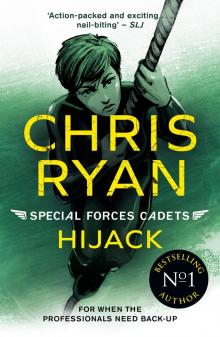 Hijack
Hijack Special Forces Cadets 2
Special Forces Cadets 2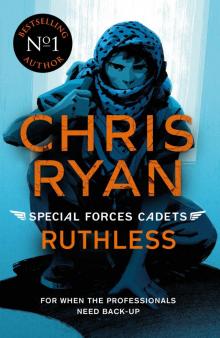 Ruthless
Ruthless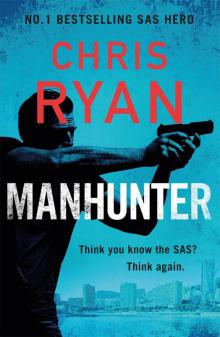 Manhunter
Manhunter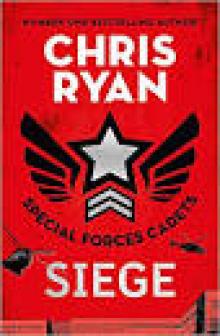 Special Forces Cadets 1
Special Forces Cadets 1 Red Strike
Red Strike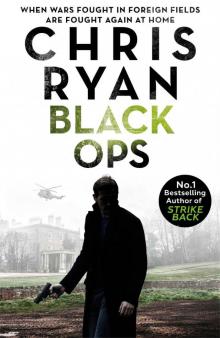 Black Ops
Black Ops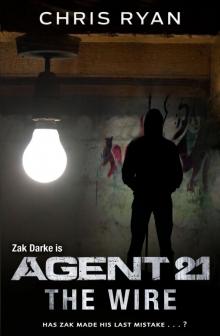 Agent 21: The Wire
Agent 21: The Wire Land of Fire
Land of Fire Alpha Force: Fault Line
Alpha Force: Fault Line Under Cover (Agent 21)
Under Cover (Agent 21)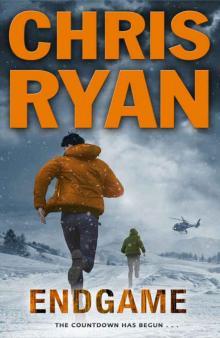 Endgame (Agent 21)
Endgame (Agent 21) Red Centre
Red Centre Blackout
Blackout Killing for the Company
Killing for the Company The Watchman
The Watchman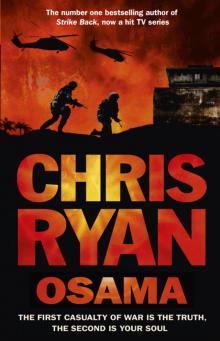 Osama
Osama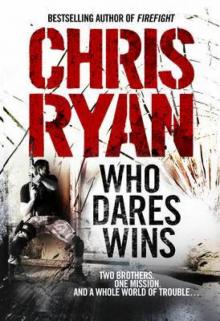 Who Dares Wins
Who Dares Wins The Kremlin Device
The Kremlin Device Hunter Killer
Hunter Killer Alpha Force: Untouchable
Alpha Force: Untouchable Stand By Stand By
Stand By Stand By Chris Ryan Extreme: Hard Target: Mission Four: Fallout
Chris Ryan Extreme: Hard Target: Mission Four: Fallout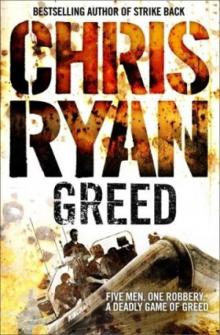 Greed mb-1
Greed mb-1 Alpha Force: Desert Pursuit
Alpha Force: Desert Pursuit Strike Back
Strike Back Greed
Greed The Bay Bulls Standoff
The Bay Bulls Standoff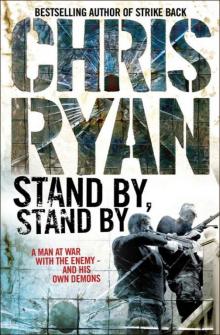 Stand By, Stand By gs-1
Stand By, Stand By gs-1 Outbreak
Outbreak Hunted
Hunted Vortex cr-4
Vortex cr-4 Rat-Catcher
Rat-Catcher Vortex
Vortex Bad Soldier
Bad Soldier Shadow Kill: A Strikeback Novel
Shadow Kill: A Strikeback Novel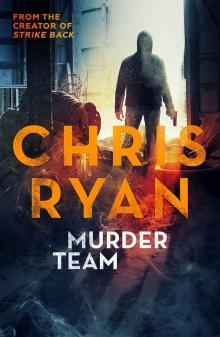 Murder Team (Kindle Single)
Murder Team (Kindle Single) One Good Turn
One Good Turn Flash Flood cr-1
Flash Flood cr-1 Night Strike
Night Strike Wildfire
Wildfire Agent 21: Reloaded: Book 2
Agent 21: Reloaded: Book 2 Chris Ryan Extreme: Hard Target: Mission Two: The Rock
Chris Ryan Extreme: Hard Target: Mission Two: The Rock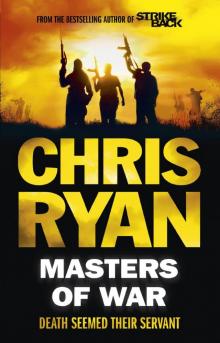 Masters of War
Masters of War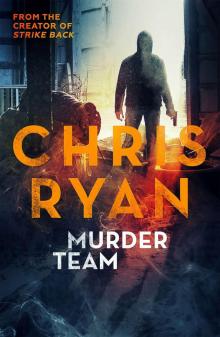 Murder Team
Murder Team War Dog
War Dog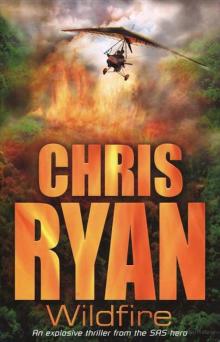 Wildfire cr-2
Wildfire cr-2 Survival
Survival The One That Got Away - Junior edition
The One That Got Away - Junior edition The Hit List
The Hit List The Kill Zone
The Kill Zone Medal of Honor
Medal of Honor Battleground
Battleground Twister
Twister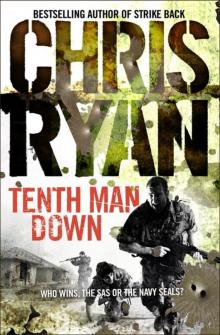 Tenth Man Down gs-4
Tenth Man Down gs-4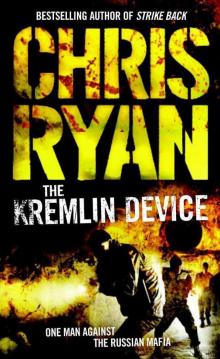 The Kremlin Device gs-3
The Kremlin Device gs-3 Hostage
Hostage Bad Soldier: Danny Black Thriller 4
Bad Soldier: Danny Black Thriller 4 Alpha Force: Blood Money
Alpha Force: Blood Money Firefight
Firefight Chris Ryan Extreme: Hard Target: Mission One: Redeemer
Chris Ryan Extreme: Hard Target: Mission One: Redeemer Hit List
Hit List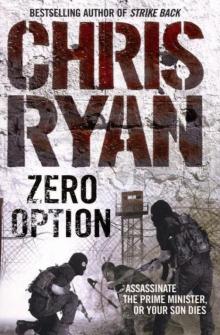 Zero Option gs-2
Zero Option gs-2 Black Gold
Black Gold Agent 21: Codebreaker: Book 3
Agent 21: Codebreaker: Book 3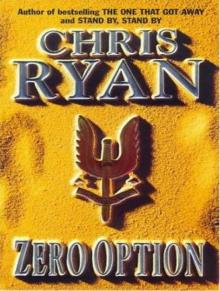 Zero Option
Zero Option Ultimate Weapon
Ultimate Weapon Tenth Man Down
Tenth Man Down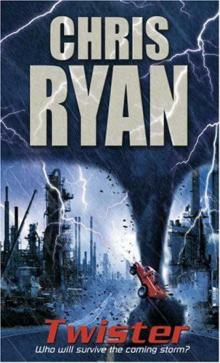 Twister cr-5
Twister cr-5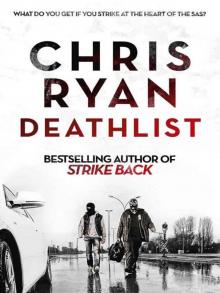 Deathlist
Deathlist Hellfire
Hellfire Flash Flood
Flash Flood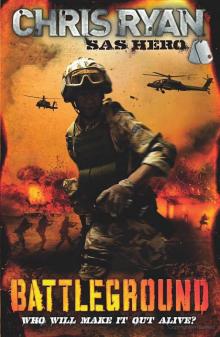 Battleground cr-6
Battleground cr-6 The Increment
The Increment